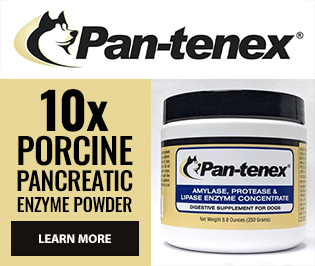When choosing a pancreatic enzyme supplement for your dog, the ingredients matter just as much as the potency. One important consideration that many pet owners overlook is whether the product contains acetone, a chemical solvent that may raise concerns for dogs with sensitive digestion or long-term needs. In this article, we’ll explain what acetone does in enzyme supplements and why a product like Pan-tenex, which is acetone-free, may be the better choice.
What Is Acetone and Why Is It Used in Some Enzyme Products?
Acetone is an industrial solvent often used during the manufacturing of some enzyme powders. It helps remove fats and moisture during the drying and stabilization process. While acetone is commonly used in industrial and cosmetic applications, it may be included in trace amounts in certain lower-cost enzyme supplements that are made in China.
The problem? Products that carry a strong acetone odor are generally discouraged, as most dogs find them unpalatable over time. In addition, enzymes made with acetone often raise quality concerns, since many of these materials are produced in Chinese factories where quality controls are not as rigorous as those in the U.S. or EU.
Another issue with Chinese acetone-based enzymes is that they are frequently sterilized through a method known as Gamma Radiation. This process exposes the finished material to low-dose radiation to reduce bacteria and virus levels to an acceptable range. Because their facilities and production standards lag behind those in the U.S. and Europe, Chinese factories rely on this approach. In fact, China is the only country still using gamma sterilization, a practice that has been banned in many regions over safety concerns.
Recently, some very inexpensive “10x” enzyme products with an acetone odor have appeared in the U.S. market (i.e. Amazon) while claiming to be made domestically. This is misleading, since no U.S. pancreatin manufacturer uses acetone in production. When labels make such claims, it calls into question the honesty of the brand and the safety of the product for pets.
For these reasons, it is best to choose enzymes that have a neutral odor profile and are produced using alcohol-based extraction methods. These are easier to introduce to a sick dog which is already under stress and provides greater confidence in both the safety and quality of the enzyme being used.
Even small traces of chemical solvents like acetone can also be irritating to a dog’s digestive system, especially for pets who already struggle with enzyme deficiencies, poor absorption, or food sensitivities.
Potential Risks of Acetone in Digestive Enzyme Supplements
While small amounts of acetone may not be harmful to most healthy dogs, those with ongoing digestive issues may be more sensitive. Dogs receiving enzymes at every meal can be exposed to residual acetone several times a day, leading to the following potential problems:
- Stomach irritation or vomiting in dogs that are sensitive to chemical residues.
- Reduced enzyme effectiveness if the body reacts poorly to the additive, causing digestive upset or reluctance to eat.
- Unnecessary chemical exposure over long periods, especially when safer, food-grade alternatives are available.
Choosing an Acetone-Free Alternative
Pan-tenex is formulated without acetone or other harsh solvents. It is a food-grade, high-potency pancreatic enzyme powder made specifically for dogs, offering 10x concentrations of lipase, protease, and amylase. For many pet owners, it provides peace of mind knowing that no chemical solvents are used in the manufacturing process.
Not only does Pan-tenex avoid acetone, but it also does NOT contain added lactose, sugars, dairy fillers, and unnecessary binders that are often used as a cutting agent in weaker 6x and 8x enzymes. This makes it more palatable to your dog’s stomach and potentially more effective over the long-term.
How to Tell If Your Dog’s Enzyme Product Contains Acetone
It is not always easy to tell whether a pancreatic enzyme product contains acetone or was processed using acetone. Look for these signs:
- No mention of food-grade processing. If the manufacturer does not specify how the enzymes were processed, it’s worth asking or choosing a product that is fully transparent.
- Strong chemical or cat-urine type smell. This usually indicates a residual acetone content is present.
Final Thoughts
If your dog requires long-term digestive enzyme support, it makes sense to choose a clean, safe, and effective supplement. Acetone-free options like Pan-tenex eliminate unnecessary chemical exposure while offering high-potency digestive support in a food-grade formula.
Learn more about related topics in our Help Articles:
- How to Mix Enzyme Powder with Your Dog’s Food
- What If My Dog Will Not Eat Their Food with Pancreatic Enzymes?
- Introducing Digestive Enzymes for the First Time
Still have questions? Contact us for additional support.

